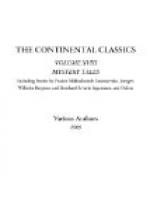Beside him sat an old gentleman, with white hair and ruddy complexion. This was Simon Bardy, an ancient relative, who had grown old with the grandmother of the family.
The same peculiarity characterized every countenance in the Bardy family—namely the lofty forehead and marked brows, and the large deep-blue eyes, shaded by their heavy dark lashes.[1]
“How singular!” exclaimed one of the party; “we are thirteen at table to-day.”
“One of us will surely die,” said the old lady; and there was a mournful conviction in the faint, trembling tones.
“Oh, no, grandmother, we are only twelve and a half!” exclaimed the young mother, taking the little one on her knee.
“This little fellow only counts half on the railroad.”
All the party laughed at this remark, even the little cripple’s countenance relaxed into a sickly smile.
“Ay, ay,” continued the old lady, “the trees are now putting forth their verdure, but at the fall of the leaf who knows if all of us, or any of us, may still be sitting here?”
* * * * *
Several months had passed since this slight incident.
In one of the apartments of the castle, the eldest Bardy and his son were engaged in earnest conversation.
The father paced hastily up and down the apartment, now and then stopping short to address his son, who stood in the embrasure of one of the windows. The latter wore the dress of the Matyas Hussars[2]—a gray dolmany, with crimson cord; he held a crimson csako, with a tricolored cockade, in his hand.
“Go,” said the father, speaking in broken accents; “the sooner the better; let me not see you! Do not think I speak in anger, but I cannot bear to look at you, and think where you are going. You are my only son, and you know how I have loved you—how all my hopes have been concentrated in you. But do not think that these tears, which you see me shed for the first time, are on your account; for if I knew I should lose you,—if your blood were to flow at the next battle,—I should only bow my head in dust and say, ’The Lord gave, and the Lord takes away, blessed be His holy name!’ Yes, if I heard that you and your infatuated companions were cut to pieces, I could stifle the burning tears; but to know that your blood, when it flows, will be a curse upon the earth, and your death will be the death of two kingdoms—”
“They may die now; but they will regenerate——”
“This is not true; you only deceive yourselves with the idea that you can build up a new edifice when you have overthrown the old one. Great God, what sacrilege! Who had intrusted you with the fate of our country, to tempt the Almighty? Who authorized you to lose all there is for the hope of what may be? For centuries past have so many honorable men fought in vain to uphold the old tottering constitution, as you call it? Or were they not true patriots and heroes? Your companions have hissed their persecuted countrymen in the Diet; but do they love their country better than we do, who have shed our blood and sacrificed our interests for her from generation to generation, and even suffered disgrace, if necessary, to keep her in life?—for though that life has been gradually weakened, still it is life. You promise her glory; but the name of glory is death!”




